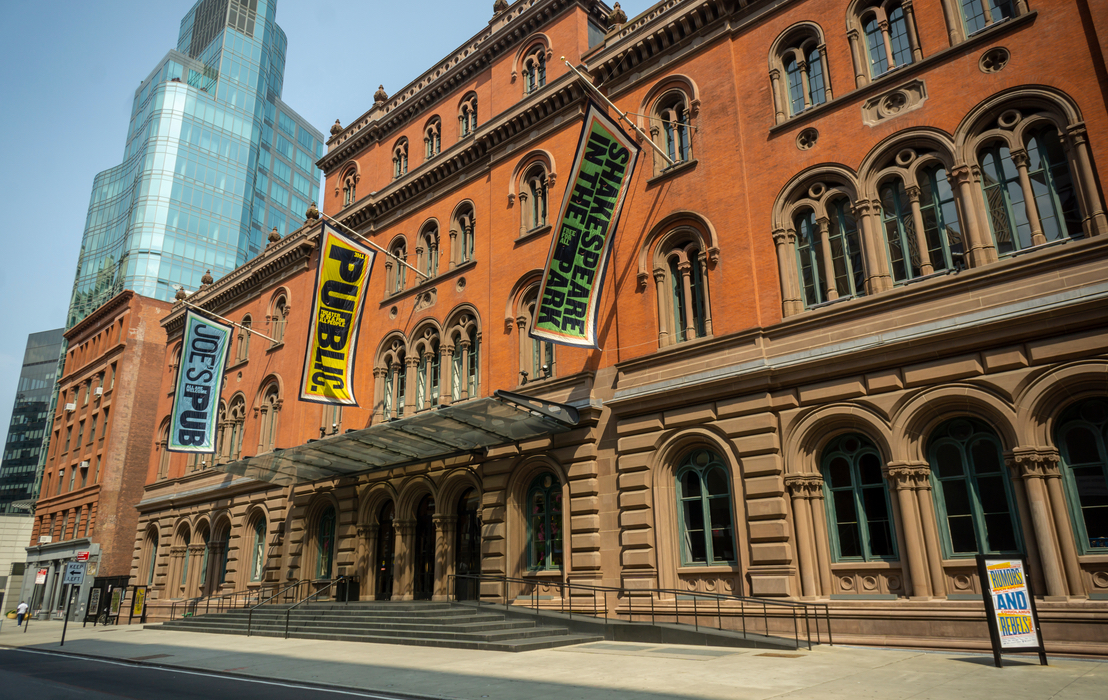[ad_1]
In a time when all the pieces round us appears politicized, even Shakespeare can’t provide a refuge—a minimum of not when the Public Theater’s “Shakespeare in the Park” is in session.
A quick primer for individuals who don’t stay in New York City and don’t know what its “Shakespeare in the Park” is all about: Every summer season, New York’s Public Theater phases two Shakespeare performs in an out of doors amphitheater in Central Park. Seating is free, working by way of a random lottery system, and scoring tickets is all the time a pleasant little coup. The productions themselves are typically nice however populist, of the go-big-or-go-home selection, and infrequently characteristic some large title actor enjoying the lead.
I not too long ago acquired an e mail saying that this yr’s manufacturing—only one quite than two in gentle of the pandemic—can be The Merry Wives of Windsor. Not precisely top-flight Shakespeare, however what actually caught my eye was the boastful point out of the manufacturing’s “complete all-Black cast.”
Now, let me make one thing clear: Just as I’ve no drawback with an opera manufacturing casting a 50-year-old, 300-pound girl in the position of Isolde if it means we’re handled to a virtuoso vocal efficiency, I’ve no drawback with race-blind casting that winds up placing black actors in the roles of Brits, Swedes, or Russians that Shakespeare, Ibsen, or Chekhov won’t have acknowledged. Given Shakespeare’s carefree perspective in direction of all issues of historic or regional accuracy—his Danes, Venetians, and historical Romans would possibly as effectively all be Sixteenth-century English women and gents—my sturdy suspicion is that he would have taken up to date multi-racial casting in stride.
The justification for multi-racial casting, a minimum of in my thoughts, is that it’s merely who we’re as a society, and so it’s naturally who our gifted and out there actors are as effectively. Just as there may be nothing fallacious with a Shakespeare manufacturing in China utilizing Chinese actors, a Shakespeare manufacturing in New York ought to go forward and use the greatest actors out there right here, which normally means actors of all races. The message, to the extent that there’s one, is that an actor’s race doesn’t matter.
A really completely different—certainly, the reverse—message is shipped, nonetheless, when a manufacturing not solely goes out of its technique to solid all black actors in a Shakespeare play, however greater than that, proudly proclaims the selection in its promotional supplies. Needless to say, an e mail proudly saying a deliberate white-actors-only manufacturing would rapidly and deservedly discover all these related to it on the everlasting unemployment line.
So what was the justification for this informal in-your-face racism? “Set in South Harlem amidst a vibrant and eclectic community of West African immigrants, MERRY WIVES will be a celebration of Black joy, laughter, and vitality,” the e mail defined. Black pleasure, laughter and vitality? Now, what precisely is “black joy”? Is it, maybe, extra uninhibited and exuberant than its pale, restrained white counterpart? And isn’t describing a black group as “vibrant” in 2021 roughly akin to conjuring up the stereotype of an “articulate black man”? The cringeworthy textual content learn as if it got here courtesy of the similar geniuses who, after George Floyd was killed, determined it will be a dandy concept for a bunch of Democratic senators and representatives, for no obvious cause, to don some Ghanian kente stoles and kneel on the flooring of the U.S. Capitol Building.
It is unquestionably not an excellent omen when the textual content selling an installment in an artwork kind constructed on phrases is totally tone deaf, and I anticipate that the solely ones who will fail to seek out this racial pandering completely laughable will probably be the septuagenarian white liberal elites who stay in the multi-million greenback actual property in the quick neighborhood of Central Park and their solely barely poorer cousins occupying the most fascinating zip codes of Manhattan’s Upper West and Upper East Side.
As far as the remainder of us, I anticipate I’m talking on behalf of lots of people once I say that our complete public life more and more looks like a foul efficiency placed on for another person—a tiny subset of unrepresentative, outspoken activists, fellow vacationers with outsized voices and their semi-senile patrons oblivious to the grotesque character of those canine and pony exhibits.
I really like nice artwork and consider it, at its greatest, as life’s single best pleasure. I used to imagine that public funding of the arts was an unqualified boon, an indispensable lifeline for a essential public good and particularly for the promotion of the sorts of classical repertory-type work that’s now not topic to copyright safety and that, subsequently, might not present fairly the similar incentive for the full vary of market actors concerned as they’d get from boosting work during which a number of of them maintain copyrights.
Because I believed it will assist to guard such public funding, I even supported the Supreme Court’s controversial 1998 resolution in National Endowment for the Arts v. Finley, which held that the authorities had the proper to not fund artwork broadly thought-about obscene and that this didn’t violate anybody’s First Amendment rights (reminiscent of the rights of the flag-burning, obscenity-peddling efficiency artist Karen Finley). As Justice Scalia wrote in a memorable phrase from his concurring opinion, “Avant-garde artistes such as respondents remain entirely free to épater les bourgeois; they are merely deprived of the additional satisfaction of having the bourgeoisie taxed to pay for it.”
I supported the resolution whereas being totally cognizant of the truth {that a} near-universally acknowledged excessive level of Western civilization reminiscent of James Joyce’s Ulysses was considered as obscene and banned in its personal day. My reasoning, subsequently, was not that I trusted the technocrats in control of administering such packages all the time to get it proper, however quite that if we didn’t give them the leeway to gauge the public’s barometer and withhold funding from artwork that flouts our group requirements, the public will merely demand that the authorities stop all public funding for the arts.
Today, nonetheless, I discover myself a member of that public demanding our governments—federal, state and native—stop all public funding for the arts. Today, the tradition commissars in control of administering such packages are now not defending our group requirements and are as a substitute working onerous to make the most of artwork as technique of imposing the divisive politics of a woke oligarchy on the remainder of us.
Notably, as an illustration, this isn’t the first time that the Public Theater’s “Shakespeare in the Park” has used its substantial platform to stage political stunts. In an earlier show of poor style, its 2017 manufacturing of Julius Caesar notoriously put a Trump clone in the title position in order that it might enact his ritual assassination. Such two-bit theatrics diminish Shakespeare and our personal public sphere.
While it shamelessly peddles such outrages, the Public Theater is permitted to function as a tax-exempt non-profit, and as of the 2018-19 season, the final pre-pandemic yr for which information is on the market, makes use of its practically $94 million in gross receipts to pay, amongst different extremely compensated workers, a $855,594 wage to its inventive director Paul J. Eustis, a $442,702 wage to its government director Patrick Willingham and a $381,249 wage to its chief development officer Laurence Jahns. At the similar, as Forbes has reported, the theater had acquired practically $30 million in metropolis, state, and federal funding between 2009 and 2017.
To be clear, up to date artwork that’s solely or largely privately funded isn’t a lot better. But the distinction right here is that we will tune—and more and more are tuning—it out. Fewer and fewer of us, for instance, are watching the self-indulgent awards exhibitsand the underlying programming upon which the politicking leisure business is conferring its awards. Faced with diminishing revenue margins, the moguls and personal entities that produce this sort of fare must do some soul-searching and determine methods to cease alienating the plenty upon which they rely for his or her pocket change.
But we’ve no related selection with regards to publicly funded arts. From a purely monetary standpoint, The Public Theater couldn’t care much less whether or not or not I join the lottery to get my free ticket to their newest outrage. I and each different taxpayer are paying for them to spit in our faces both means. That must cease. If the technocrats that function the public feeding trough is not going to defend us from such assaults, then we’ll defund them.
“Art lives from constraints and dies from freedom,” Leonardo da Vinci seemingly stated. Artists painted right into a nook are compelled to innovate their means out of it, whereas artists to whom each door is left open will take the straightforward means out. Perhaps the late Twentieth- and early Twenty first-century West, with no extra constraints imposed both by Church or State, took it too straightforward on the arts and so yielded comparatively few nice, lasting works and far that was forgettable. Seen in that gentle, maybe the proven fact that the new woke inquisition is selling time-bound, politicized works whereas kicking nice artwork off in fact syllabi and really helpful studying lists and out of different public areas will drive nice artists-to-be to seek out new methods to defy the censors and impress their designs upon us.
But perhaps it’s time to impose but one additional constraint: kick the arts off the public dole. Disconnect the prepared lifeline provided by the likes of the bloated, doddering Public Theater. Let artists wrestle to outlive. Let them seek for patrons and sponsors. Let them go avant-garde once more and discover their means again to the middle like a phoenix rising from the ashes. Let them stay in exile till they earn their return to our midst.
As far as this specific decadent manufacturing of The Merry Wives of Windsor, nonetheless, whereas it has already acquired its public funding, I’ll do my little half by not taking part on this yr’s free ticket giveaway. If you might be right here in New York, you would possibly take into account doing the similar. Let the Public Theater discover itself at pains to offer its tickets away totally free. And let Shakespeare’s personal phrases from The Merry Wives of Windsor render a remaining verdict on this manufacturing, with out your having to endure the ache of watching it: “Here will be an old abusing of God’s patience and the king’s English.”
Alexander Zubatov is a practising legal professional specializing generally business litigation. He can also be a practising author specializing generally non-commercial poetry, fiction, essays and polemics which have been featured in a large number of publications. He lives in the stomach of the beast in New York, New York. He will be discovered on Twitter @Zoobahtov.
[ad_2]
Source hyperlink















